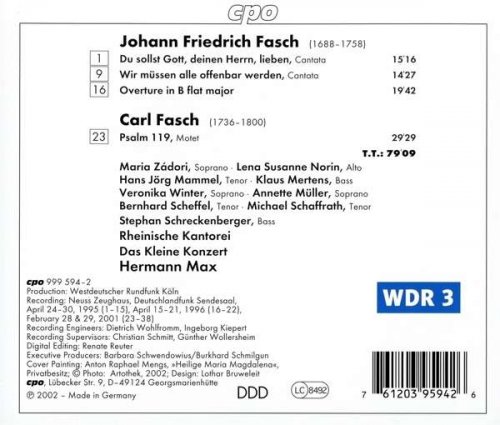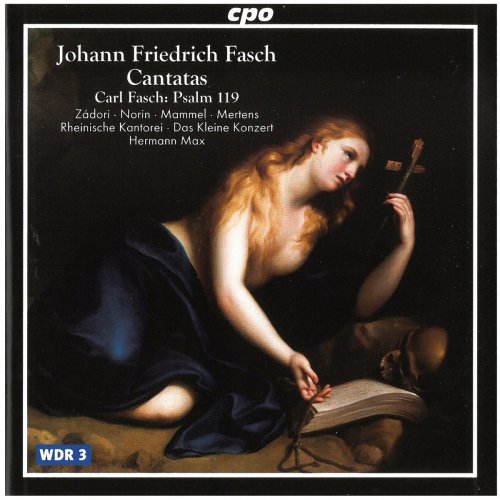
Rheinische Kantorei - Fasch: Cantatas (2002)
BAND/ARTIST: Rheinische Kantorei
- Title: Fasch: Cantatas
- Year Of Release: 2002
- Label: CPO
- Genre: Classical
- Quality: FLAC (tracks)
- Total Time: 78:334 min
- Total Size: 337 MB
- WebSite: Album Preview

Tracklist:
01. Du sollst Gott, deinen Herrn, lieben, FWV D:D10: I. Du sollst Gott, deinen Herrn, lieben
02. Du sollst Gott, deinen Herrn, lieben, FWV D:D10: II. Göttliche flamme vollkommenster Liebe
03. Du sollst Gott, deinen Herrn, lieben, FWV D:D10: III. Ach lieber Gott
04. Du sollst Gott, deinen Herrn, lieben, FWV D:D10: IV. Zünd uns ein Licht an im Verstand
05. Du sollst Gott, deinen Herrn, lieben, FWV D:D10: V. Wer Gott von Herzen liebt
06. Du sollst Gott, deinen Herrn, lieben, FWV D:D10: VI. Wer seinen Nächsten hasset
07. Du sollst Gott, deinen Herrn, lieben, FWV D:D10: VII. Ich will dich lieben, weil ich lebe
08. Du sollst Gott, deinen Herrn, lieben, FWV D:D10: VIII. Nur allein dass du mich stärkest
09. Wir müssen alle offenbar werden, FWV D:W8: I. Wir müssen alle offenbar werden
10. Wir müssen alle offenbar werden, FWV D:W8: II. Mein Gott! Wer denkt doch wohl daran?
11. Wir müssen alle offenbar werden, FWV D:W8: III. Denkt doch nicht, verstockte Seelen
12. Wir müssen alle offenbar werden, FWV D:W8: IV. Hier ist die Majestät
13. Wir müssen alle offenbar werden, FWV D:W8: V. O Jesu, hilf zur selben Zeit
14. Wir müssen alle offenbar werden, FWV D:W8: VI. Ich weiß du läßt mich Gnade finden
15. Wir müssen alle offenbar werden, FWV D:W8: VII. Derhalben mein Fürsprecher sei
16. Overture in B-Flat Major, FWV K:B3: I. Overture
17. Overture in B-Flat Major, FWV K:B3: II. Air
18. Overture in B-Flat Major, FWV K:B3: III. Plaisanterie
19. Overture in B-Flat Major, FWV K:B3: IV. Air un poco allegro
20. Overture in B-Flat Major, FWV K:B3: V. Alla breve
21. Overture in B-Flat Major, FWV K:B3: VI. Menuet I
22. Overture in B-Flat Major, FWV K:B3: VII. Menuet II
23. Psalm 119, Pt. 1: I. Heil dem Mann, der rechtschaffen lebet
24. Psalm 119, Pt. 1: II. Der ist wie ein Baum, der seine Frucht bringet
25. Psalm 119, Pt. 1: III. Leite mich in deiner Vorschrift steige
26. Psalm 119, Pt. 1: IV. Heil dem, o treuer Gott
27. Psalm 119, Pt. 1: V. Du bist gütig und freundlich
28. Psalm 119, Pt. 1: VI. Wenn denn Wort offenbar wird
29. Psalm 119, Pt. 1: VII. Ich will mit meinen Lippen
30. Psalm 119, Pt. 1: VIII. Meine Zunge rühmt im Wettgesang dein Lob
31. Psalm 119, Pt. 2: IX. Unsre Missetat drücket uns hart
32. Psalm 119, Pt. 2: X. Meine Seele liegt im Staube
33. Psalm 119, Pt. 2: XI. Dein Wort ist meinem Munde süßer denn Honig
34. Psalm 119, Pt. 2: XII. Meine Seele hanget dir an
35. Psalm 119, Pt. 2: XIII. Wie hab' ich dein Gesetz so lieb
36. Psalm 119, Pt. 2: XIV. Dein Gesetz ist mein ergötzen
37. Psalm 119, Pt. 2: XV. Herr, du bist wahr
38. Psalm 119, Pt. 2: XVI. Lass dir gefallen, Herr
How far composing sons and fathers can be stylistically apart is often demonstrated by the comparison between Johann Sebastian and Johann Christian Bach. Well, there is a similar case: Johann Friedrich Fasch (1688-1758) and his son Carl (1736-1800)
Throughout his life, his father was a Kapellmeister in the Central German Province, in Zerbst, Telemann, who was deeply connected both humanely and artistically. His son Carl was - besides CPE Bach - harpsichordist at the court of Frederick II in Berlin and founder of the Berlin Singakademie, which then took over Zelter and Mendelssohn after him. If his father tried to integrate the "galant" style - true to his reverence for Telemann - into the high baroque tonal language, Carl was fascinated by the polyphonic counterpoint of the old Italian masters of the 16th century and tried to emulate it in composition: his main work became a 16-part a cappella mass. Hermann Max, the Rheinische Kantorei and the Kleine Konzert now confront father and son on a CD: Johann Friedrich with two cantatas and an overture suite and Carl with Psalm 119 for 8-part a cappella choir. An exciting encounter.
Throughout his life, his father was a Kapellmeister in the Central German Province, in Zerbst, Telemann, who was deeply connected both humanely and artistically. His son Carl was - besides CPE Bach - harpsichordist at the court of Frederick II in Berlin and founder of the Berlin Singakademie, which then took over Zelter and Mendelssohn after him. If his father tried to integrate the "galant" style - true to his reverence for Telemann - into the high baroque tonal language, Carl was fascinated by the polyphonic counterpoint of the old Italian masters of the 16th century and tried to emulate it in composition: his main work became a 16-part a cappella mass. Hermann Max, the Rheinische Kantorei and the Kleine Konzert now confront father and son on a CD: Johann Friedrich with two cantatas and an overture suite and Carl with Psalm 119 for 8-part a cappella choir. An exciting encounter.
As a ISRA.CLOUD's PREMIUM member you will have the following benefits:
- Unlimited high speed downloads
- Download directly without waiting time
- Unlimited parallel downloads
- Support for download accelerators
- No advertising
- Resume broken downloads


